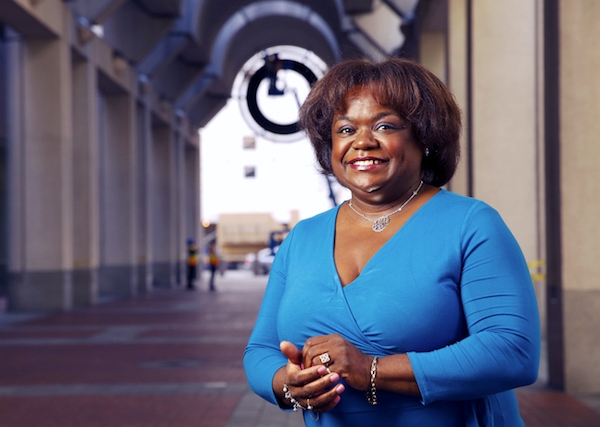Lessons Abroad Fuel a Career at Home

Middlebury Institute alumna Lena Robinson BA Japanese ’86 came home to the Bay Area 16 years ago to work for the Federal Reserve Bank in San Francisco. In her role there as community development regional manager for northern California, Robinson helped get banks to invest in projects to benefit lower-income areas.
“The whole community development industry grew out of the Community Reinvestment Act of 1977, created as a response to financial discrimination among banks called ‘redlining,’” she says.
Robinson has recently been hired as director of community development at First Republic Bank, where she is carrying out many of the ideas that she once promoted at the Federal Reserve.
It’s a different career path than she envisioned for herself when she first came to MIIS. She recalls that she studied Japanese at the Institute because she thought it was a good language choice for becoming an international business interpreter, which was her dream at the time. Instead, living in Japan started her journey toward a career in social justice. She taught English to Japanese businessmen and worked at the International Exposition in Japan for the United States Information Agency (USIA). “Japan is a beautiful country and there is a lot that I love about it,” she says. But she never felt like she fit in. “I was more like an entertainer. As a nonnative, I realized that I was probably never going to advance in my career.”
During the 18 months Robinson lived in Japan, she had many occasions to travel around the region. It was while travelling in the Philippines that she felt like she saw the true face of poverty. “People were living in shacks, with no running water or other basics,” she says—a sharp contrast to growing up in a middle class home in San Francisco. “Seeing it up close was very touching.” Robinson recalls in particular one day while walking on a rural road in the mountains of the Philippines, on her way to visit the majestic rice terraces, “a little boy around five years old came up to me to ask for money.” Beyond having no shoes, wearing torn clothes, and being covered in grime, what really stood out to her was that he was clearly biracial.
Meeting this little boy, who she speculated was the child of an African American soldier, brought up deeper questions about poverty, race, and opportunity. She began to wonder about the roots of global poverty and how they contributed to the economic condition and social experience of black people throughout the world. The experience touched her in profound ways and sparked a desire for a career where she could make a difference.
After earning a graduate degree in African Studies with an emphasis on rural economic development from Ohio University, Robinson worked on issues related to microcredit in Kenya and Tanzania. She says her time in Africa taught her a lot about the global financial structure and the role of governments. “By deciding how to invest money to benefit the population, governments play the most significant role in the quality of life of their citizens.”
In northern California, the main current economic challenges are related to high cost of housing and skills mismatch, or when people are unemployed because they lack the education or skills for the available jobs. Investing in affordable housing is often the “go-to” for banks according to Robinson. And while this is important, Robinson is not under the illusion that it is sufficient to resolve what she characterizes as the larger structural challenges of greed, corruption, and prejudice that maintain poverty and inequality.
American poverty is “still more prevalent among people of color” according a 2009 National Poverty Center brief, The Colors of Poverty: Why Racial and Ethnic Disparities Persist. The authors agree with Robinson when she says it begins early: “The education you get is defined by where you live and where you live depends a lot on race and income.” Disadvantages accumulate and often continue in future generations “We have to look at the broader issues perpetuating poverty,” she says. “There are no simple solutions.”
While Robinson worries about rising economic inequality in the U.S., she chooses to be optimistic about the future and feels blessed to be able to do the work she does. “The opportunity to travel and have an internationally focused education has really crystallized for me the universal issues we all share.” Given the right support and opportunities, Robinson says, most people—regardless of race or nationality—will do what it takes to lift their families out of poverty.
For More Information
Jason Warburg
jwarburg@middlebury.edu
831.647.3156
Eva Gudbergsdottir
eva@middlebury.edu
831.647.6606
